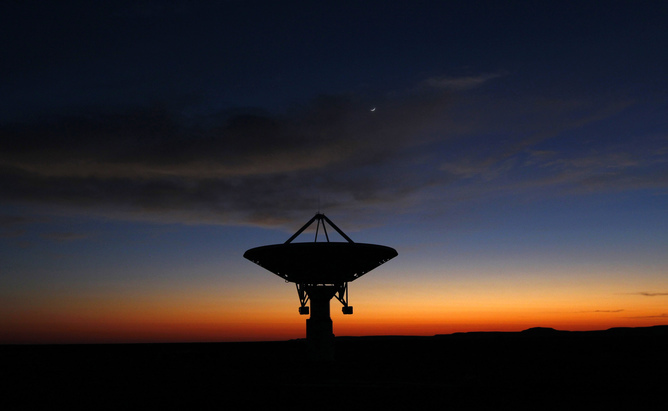“Jurassic World: Dominion” is hyperbolic Hollywood entertainment at its best, with an action-packed storyline that refuses to let reality get in the way of a good story. Yet just like its predecessors, it offers an underlying cautionary tale of technological hubris that’s very real. As I discuss in my book “Films from the Future,” Stephen Spielberg’s 1993 “Jurassic Park,” based on Michael Crichton’s 1990 novel, didn’t shy away from grappling with the dangers of unfettered entrepreneurship and irresponsible innovation. Scientists at the time were getting closer to being able to manipulate DNA in the real world, and both book and…
Author: The Conversation
A newly discovered fast radio burst has some unique properties that are simultaneously giving astronomers important clues into what may cause these mysterious astronomical phenomena while also calling into question one of the few things scientists thought they knew about these powerful flares, as my colleagues and I describe in a new study in Nature on June 8, 2022. Fast radio bursts, or FRBs, are extremely bright pulses of radio waves that come from faraway galaxies. They release as much energy in a millisecond as the Sun does over many days. Researchers here at West Virginia University detected the first FRB back in 2007.…
A picture may be worth a thousand words, but thanks to an artificial intelligence program called DALL-E 2, you can have a professional-looking image with far fewer. DALL-E 2 is a new neural network algorithm that creates a picture from a short phrase or sentence that you provide. The program, which was announced by the artificial intelligence research laboratory OpenAI in April 2022, hasn’t been released to the public. But a small and growing number of people – myself included – have been given access to experiment with it. As a researcher studying the nexus of technology and art, I was keen to see…
We take it for granted that technology brings people closer together and improves our access to essential products and services. If you can’t imagine life without your smartphone, it’s easy to forget that people who can’t or don’t want to engage with the latest technology are being left behind. For example, there have recently been reports that cashless payment systems for car parking in the UK are seeing older drivers unfairly hit with fines. This has led to calls for the government to intervene. Age is one of the biggest predictors of digital exclusion. Only 47% of those aged 75 and over use the internet regularly.…
We often imagine that human consciousness is as simple as input and output of electrical signals within a network of processing units – therefore comparable to a computer. Reality, however, is much more complicated. For starters, we don’t actually know how much information the human brain can hold. Two years ago, a team at the Allen Institute for Brain Science in Seattle, US, mapped the 3D structure of all the neurons (brain cells) comprised in one cubic millimetre of the brain of a mouse – a milestone considered extraordinary. Within this minuscule cube of brain tissue, the size of a grain…
Recently developed artificial intelligence (AI) models are capable of many impressive feats, including recognising images and producing human-like language. But just because AI can perform human-like behaviours doesn’t mean it can think or understand like humans. As a researcher studying how humans understand and reason about the world, I think it’s important to emphasise the way AI systems “think” and learn is fundamentally different to how humans do – and we have a long way to go before AI can truly think like us. Read more: Robots are creating images and telling jokes. 5 things to know about foundation models and…
Apple has joined the thriving “buy now, pay later” industry, with a customised service called Apple Pay Later. The service was announced earlier this week at the 2022 Worldwide Developers Conference, and will initially be launched in the United States later this year. Pay Later will be built into the Apple Wallet and eligible for use on any purchase made through Apple Pay. Customers will be able to split the cost of a purchase into four equal payments, with zero interest and fees, spread over a period of four months. To qualify, however, Apple will first do a soft credit check on users wanting to…
A new generation of artificial intelligence (AI) models can produce “creative” images on-demand based on a text prompt. The likes of Imagen, MidJourney, and DALL-E 2 are beginning to change the way creative content is made with implications for copyright and intellectual property. While the output of these models is often striking, it’s hard to know exactly how they produce their results. Last week, researchers in the US made the intriguing claim that the DALL-E 2 model might have invented its own secret language to talk about objects. DALLE-2 has a secret language. “Apoploe vesrreaitais” means birds. “Contarra ccetnxniams luryca tanniounons” means bugs or pests. The…
When a state of disaster was declared in South Africa in 2020 in response to the COVID pandemic, a hard lockdown was instituted and schools were shut. This was followed by varying periods of lockdowns, school closure and rotational timetables to maintain social distancing across different grades. Administrative data show that children in South Africa missed at least three-quarters of a year of school in the past two school years. This reduced their opportunities to learn and allowed more time to forget what they had learnt. To measure the effect of time out of school on learning, we analysed the test performance of almost a quarter of a…
The discovery of a neutron star emitting unusual radio signals is rewriting our understanding of these unique star systems. My colleagues and I (the MeerTRAP team) made the discovery when observing the Vela-X 1 region of the Milky Way about 1,300 light years away from Earth, using the MeerKAT radio telescope in South Africa. We spotted a strange-looking flash or “pulse” that lasted about 300 milliseconds. The flash had some characteristics of a radio-emitting neutron star. But this wasn’t like anything we’d seen before. Intrigued, we scoured through older data from the region in hopes of finding similar pulses. Interestingly, we did…










